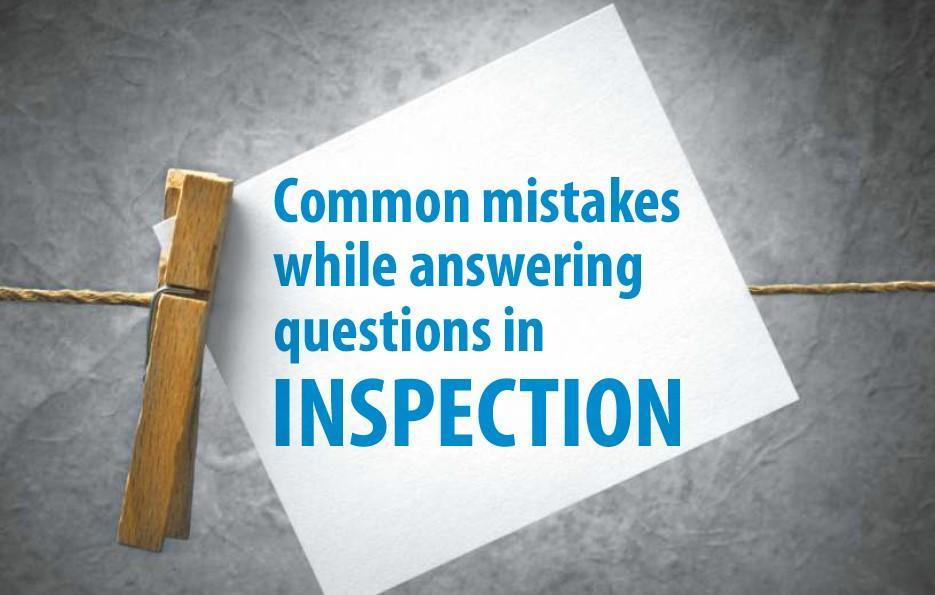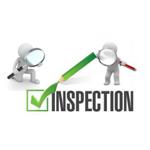
By: Dhavalkumar Surti
In this specific article we will understand about common mistakes made by personnel facing audit while answering questions asked by auditors during a regulatory inspection.
Regulatory inspection is important to pharmaceutical companies doing business in regulated market and inspection by auditors is an important tool by which related country’s food and drug administration ensures that the drug products supplied to their respective countries are meeting the required standards and are safe to use for their citizens.
Being of the prime importance for the company’s business, regulatory inspection creates a tense environment both for the persons working at remains a tense affair for everyone whether or not he/she is involved or not involved in an audit.
And this tense environment usually becomes a primary reason for mistakes being made either in execution of activities or while answering questions to an auditor during the course of inspection. In this article, we will understand the reasons for mistakes being made while answering questions to an auditor.
Q. First common mistakes is, 'To start answering even before question is completed by an auditor'.
A. So what actually happens is that, an auditor asks a question and the person responsible to provide answer starts his answer even before the auditor completes his question. This happens usually because we assume the entire question just based on prefix of question, we assume the possible question based on our experience, or based on our common understating about specific topic or based on knowledge gained by common inspection trends within industry. However, even with all good intention about giving a correct answer to the auditor, this is not a correct way to answer.
The correct way to answer is first to allow the auditor to complete his question. Auditor may have some different thoughts in his/her mind while asking a specific question, which may not be the usually asked question. So the best way to answer a specific question is to first listen the entire question, and then start with your answer.
Q. Second common mistake is, 'To answer the question without completely understanding the question'.
A. This happens because of basic human nature to immediately answer the question without any delay to show our preparedness, our readiness, our willingness to answer all questions asked by auditors during a regulatory inspection to create a very good image of company, show best intent of company to provide prompt answers, to provide detailed information in order to display about knowledge, our abilities and capabilities.
It is agreed that our intentions are correct, but we need to be patient and first understand the question, understand what is being asked. You can take a 3 to 5 seconds time/pause to understand and digest the question completely.
There is nothing wrong in taking this valued time to understand the question, it is better to take some time to understand the question and give correct answer rather than answering question in a hurry just to display our promptness and provide with an incorrect answer which will cause more harm than taking some time to answer.
As a company, we are not willing and we don’t want to provide incorrect information to an auditor. We are doing correct things in our daily activities within company and we need to convey the same to auditor that our procedures and practices are adequate and in compliance to products meeting the acceptance criteria. In order to do that, it is important to understand the question before we provide with our answer.
Q. Third common mistake is, 'Assumption about question and answering to our assumption rather than answering to question'.
A. So what actually happens that based on our experience, weassume that the question is being asked because of a specific reason. This assumption comes through our previous experience, based on our interactions with industry friends about common queries during regulatory inspections. In such scenario, we answer to our assumption about the question rather than to actual question being asked.
Probably auditor might not have said anything about intent of the question, but we assume that, this specific question is being asked because of some specific reason, and auditor wants to get some information which is not directly relevant to question, auditor wants to get some information which is not directly relevant to question, auditor wants to dig out something.
We think that auditor has something else in his/her mind and we try to justify that assumption, and while doing so, we end up answering to assumption rather than the question. Ultimately, this results in providing a non-relevant or incorrect answer and auditor may not like and may think we are wasting time by not providing the required answers, we are trying to hide the real information. The key to avoid this situation is to don’t answer based on your assumption, even don’t assume anything. Simply provide ‘To the Point’ answer to the question being asked by first listening to the full question and understanding the question completely.
Q. Fourth common mistake is, 'Providing too much of information while responding to question'.
A. For example, if the auditor asks ‘Do you have a SOP (Standard Operating Procedure) for handling of incidents/deviations?’, the simplest and to the point answer to the question is ‘YES’, because every company has a SOP for handling of incidents/deviations/non-conformities. The terminology may be different, the title may be different, but SOP for handling deviations is always available
But what people do mistake while answering such question is that they start with an elaborative answer stating that, “Yes, we have a SOP, we have very good SOP, SOP title is this, in SOP we have defined how to handle deviations thoroughly, we have defined categories of deviations based on criticality, the criticality is defined based on impact on product. We have defined critical, major and minor categories of deviation based on impact assessment. We are handling incidents horoughly, we log incident on same day it happens, we immediately start investigation, etc., etc.”
Such detailed information is practically not asked by the auditor, he/she had only asked about having a SOP for handling of deviations/incidents and simple answer to that question is either ‘Yes’ or ‘No’. Provide that answer and wait for next question.
Of course, we have to provide the information asked by auditors, but don’t give too much of information in response to question which is not even asked by auditor. Even the load of information is not demanded by auditor, they don’t want to waste their time or your time in getting the information which is not required by them. They will ask further questions if more information is required, and as a good practice, we should wait for more questions rather than volunteering the information which will not help auditor or company.
Auditors have very limited time to complete the inspection and we should not waste the time by providing the details which are not asked, giving the lengthy, timeconsuming answers which are not helping auditors and not even required by them. Auditors want specific information and we should comply with that requirement without wasting time of either one.
We should understand that as a company we are not doing anything wrong in our daily practices and we follow good business ethics and this baseline understanding should always be kept in mind. We need not be too much worried about what will
happen if we remain specific and to the point.
To summarize, the below points must be kept in mind while answering questions during regulatory inspection:
- Allow the auditor to complete the question
- Understand the question before you start your answer
- Don’t answer ‘To your assumption’ about question
- Provide ‘To the Point’ and ‘Specific’ answer to the question, don’t provide ‘Too much of Information’ which even auditor will not appreciate.
Hope this article will help you to understand about answering the questions during a regulatory inspection in order to have a successful outcome for both company as well as auditors.
 Dhavalkumar Surti has more than 18 years experience in injectable manufacturing, validation, quality assurance and new facility projects. He is with pharmaceutical industry in India from 2003, working with reputed companies like Dr. Reddy’s, Sun Pharmaceuticals, Zydus Pfizer Oncology, Emcure Pharmaceuticals and Aculife Healthcare. He has core experience in aseptic technique, freeze drying, sterilization validation, smoke studies, SOP writing, investigations, training and media fills.
Dhavalkumar Surti has more than 18 years experience in injectable manufacturing, validation, quality assurance and new facility projects. He is with pharmaceutical industry in India from 2003, working with reputed companies like Dr. Reddy’s, Sun Pharmaceuticals, Zydus Pfizer Oncology, Emcure Pharmaceuticals and Aculife Healthcare. He has core experience in aseptic technique, freeze drying, sterilization validation, smoke studies, SOP writing, investigations, training and media fills.













